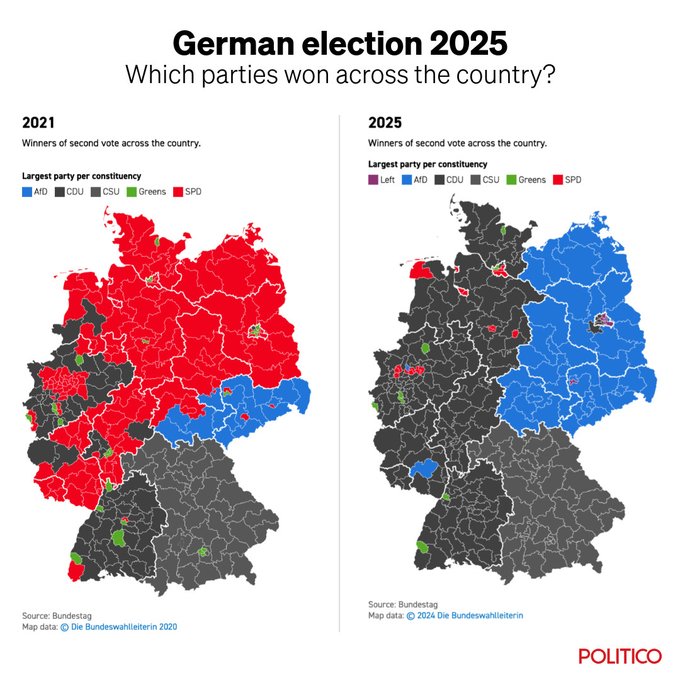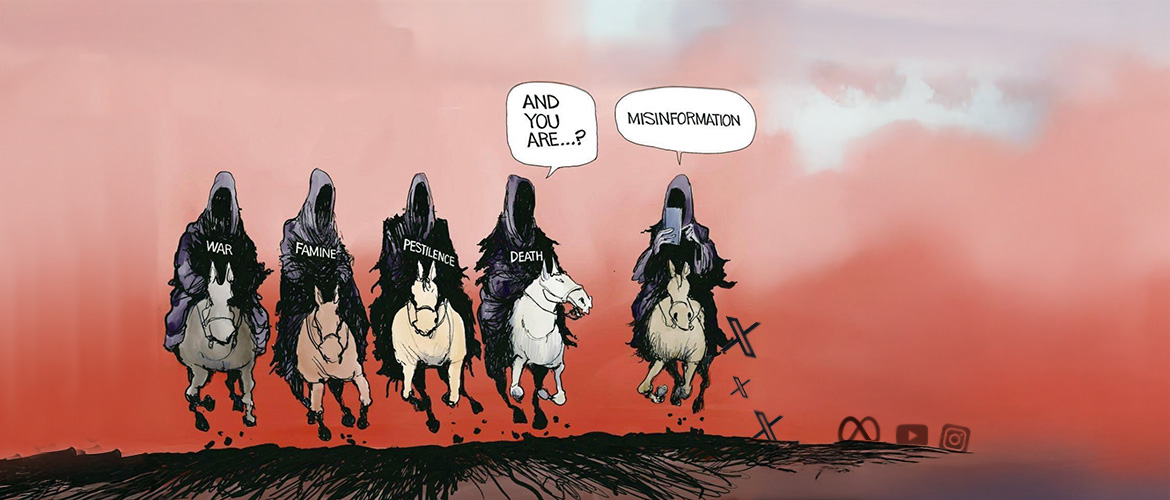Puede encontrar la versión en español en mi blog personal: https://mandomando.com/blog/
Yesterday, I shared this thought:
“Have the ex-experts on volcanoes, vaccines, AI, and natural disasters now rebranded themselves as ‘Experts in German Politics’?
Of course they have. And yet, no Politikwissenschaft, no Grundstufe. Just noise and misinformation.”
I bring this up as a marker. Here, we talk about marketing. At most, digital politics. And how it all affects business.
For years, we’ve worked with German firms. That’s why Polaris operates between different European markets, from Barcelona to Frankfurt and beyond—not by chance, but by necessity.
But what happened yesterday in Germany isn’t just about politics. It’s a reflection of something far bigger: how disinformation is reshaping economies, markets, and even digital marketing itself.
Germany’s 2025 Elections: What Happened and Why It Matters
The 2025 German elections have radically altered the political landscape. Where the SPD (Social Democrats, red) and CDU (Conservatives, black) once dominated, the AfD (Alternative for Germany, blue) has now made concerning gains—especially in the east.

AfD’s rise isn’t an isolated event. Over the past few years, the party has mastered the art of digital disinformation: oversimplified messaging, manipulated news, and a strategic use of social media to amplify fear and polarisation.
But what does this have to do with digital marketing and mid-sized businesses?
More than it seems.
Disinformation and Marketing: What Businesses Need to Learn
Disinformation hasn’t just reshaped Germany’s political map—it’s transforming the way we consume information in every industry, including business.
The Fifth Horseman of the Apocalypse: Disinformation
(The New York Times, 2021)
Think about it: if people can be influenced to vote based on false or manipulated information, what stops them from making buying decisions the same way?
The Risks of Disinformation in Business
- Fake News Damaging Brand Reputation
A well-targeted rumour can destroy a company’s image overnight. We’ve seen brands falsely accused of unethical practices or boycotted based on fabricated news. - Manipulated Data and Reviews
AI is making fake reviews, inflated ratings, and distorted customer perceptions easier than ever to manufacture. - Hidden Propaganda in Advertising
Many consumers believe they are reading independent opinions, when in reality, they are being manipulated through sophisticated digital marketing tactics.
Politics has been the perfect testing ground for these techniques. Now, disinformation is moving aggressively into marketing and consumer decision-making.
Europe, Germany, and the UK: Three Digital Mindsets
To fully grasp what’s happening, it’s useful to compare Germany, Spain, and the UK’s approach to digitalisation.
Germany: An Economic Powerhouse, but Digitally Slow
🔹 One of the strongest economies in the world, yet digitally behind.
🔹 German bureaucracy still relies on traditional, paper-based processes (yes, fax machines are still used in some government sectors).
🔹 In industry, digitalisation is strong; in services, it lags.
Spain: Faster in Digital, Weaker in Economic Power
🔹 Spain has rapidly advanced in digitalisation, especially in public services.
🔹 It has overtaken Germany in online platform usage and digital bureaucracy.
🔹 However, Germany’s economy is twice the size of Spain’s and less service-dependent.
United Kingdom: Digital Leadership, but Uncertain Regulation
🔹 The UK is among Europe’s leaders in e-commerce and fintech.
🔹 High-speed digital transformation, but facing regulatory uncertainty post-Brexit.
🔹 Strong private sector investment in AI and digital marketing, but concerns over data privacy laws and misinformation control.
What does this mean?
- In highly digitalised markets like Spain and the UK, marketing and online information are key competitive advantages.
- In Germany, slower adoption of digital tools limits opportunities but also reduces vulnerability to misinformation-driven marketing tactics.
But as disinformation spreads, these distinctions become blurred.
Digital Marketing in the Age of Disinformation: Strategies for Businesses
Mid-sized businesses rely on digital marketing to stay competitive. But in a world where disinformation is the norm, how can companies ensure customers trust what they see?
1. Radical Transparency as a Differentiator
Consumers are increasingly sceptical of traditional advertising. The solution? Extreme transparency.
✅ Show internal processes.
✅ Publish verifiable data.
✅ Avoid exaggerated claims or empty promises.
2. Fact-Checking as a Core Digital Strategy
It’s not enough to publish content—it must be credible and verifiable.
✅ Use fact-checked sources.
✅ Implement AI-powered fake news detection tools.
✅ Monitor brand mentions and correct false information before it spreads.
3. Build Authority and Community
Trust-based brands have a competitive edge.
✅ Create educational content instead of just promotions.
✅ Foster open, non-manipulative discussions.
✅ Encourage direct customer engagement to validate information.
AI and social media will continue to evolve. But trust will always be the ultimate currency.
Challenges and Risks of Navigating a Disinformation-Driven Market
While these strategies help protect businesses, it’s important to acknowledge the challenges:
- Balancing Openness and Control
Being transparent does not mean being vulnerable. Businesses must strategically decide how much internal information to share. - Speed of Disinformation vs. Speed of Response
Falsehoods spread faster than truth. Brands need real-time monitoring to mitigate damage before it escalates. - AI-Generated Fake Content
As AI advances, companies must invest in verification tools to prevent deepfakes, altered data, and misinformation campaigns. - Regulatory Uncertainty
Governments are still catching up with legislation on digital misinformation. Brands need to anticipate risks rather than react.
Conclusion: Can Your Business Survive a Market Where Information Is a Weapon?
The 2025 German elections have shown us how disinformation can reshape reality. But this is not just a political issue—it’s a warning for every business that relies on online reputation, digital marketing, and consumer trust.
In digital marketing, truth has a price. It’s not enough to sell well—you need to communicate with credibility.
 🚨 What happens when your brand becomes the target of a misinformation campaign?
🚨 What happens when your brand becomes the target of a misinformation campaign?
We help companies protect their digital presence, reinforce credibility, and stay ahead of disinformation risks.
💡 If trust is your brand’s most valuable asset, let’s make sure it stays that way. Get in touch today.




